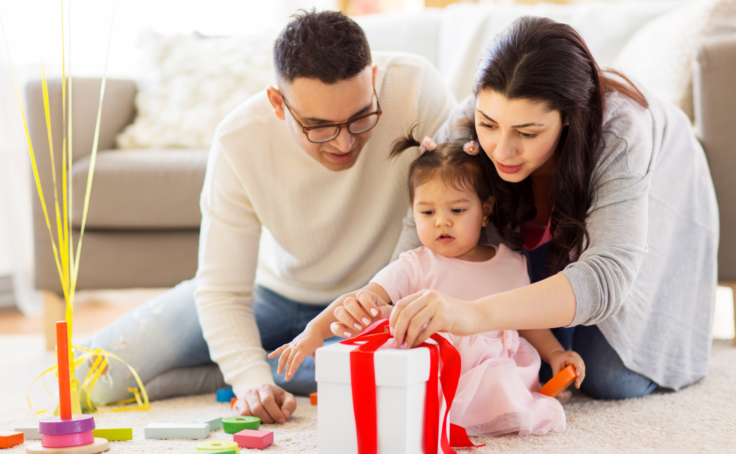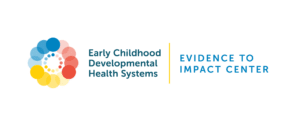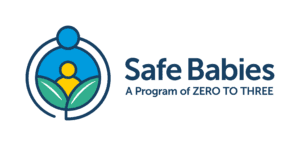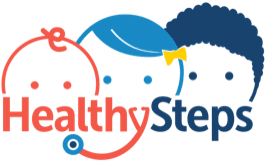What’s the best gift for babies and toddlers?


Rebecca Parlakian is ZERO TO THREE’s Senior Director of Programs at ZERO TO THREE, where she directs a portfolio…
Loving, trusting relationships from the adults who care for them.
Babies and toddlers thrive when they can depend on the love and care of their important adults.
What can grown-ups do to give children this gift? Here are my top five positive parenting practices to build strong early connections!
- Consider how babies and toddlers are feeling and what they might need in different situations. Are they crying because they’re tired or want to play?
- Respond to babies’ and toddlers’ cues in a timely way. Let them know you’re on the way, that you hear them, and that their needs are important.
- Play back-and-forth games with young children, starting as babies. When they have a chance to be the center of your attention during playtime, they feel close and connected.
- Talk and sing with babies and toddlers, and give them a chance to respond. Research shows that it’s not just our talking that makes a difference, but the pauses we take to give our children a chance to join in the conversation.
- Understand early milestones so we choose age-appropriate limit-setting strategies. Babies and toddlers have very little self-control and need adult help to manage big feelings and follow rules.
A baby's opportunity to form a strong, trusting connection with a caregiver is one of their most important milestones — a secure attachment!
Rebecca Parlakian

Debbie Cheatham serves as a Senior Technical Assistance (TA) Specialist in ZERO TO THREE’s Policy Center, providing TA through…
Equal access to developmental health and early childhood services.
Early childhood developmental health systems are critical to ensuring that babies and toddlers receive equal access to the supports they need to thrive.
Families need access to a variety of services to support the health and well-being of their babies and toddlers, including maternal health and pediatric care, early care and education, child welfare, and other human services and family support programs. Yet, far too many families – especially those who experience racial and economic inequities – face considerable obstacles in receiving the services they need to give their children a good start in life.
Early childhood developmental health systems help families receive seamless access to care. Within a system, state and community partners and organizations work to bring together early childhood, health, and family support services. To ensure services are comprehensive and reduce health disparities, systems must be evidence-informed, equity-driven, and reflective of the experiences of families that have historically faced structural barriers.
Far too many families – especially those who experience racial and economic inequities – face considerable obstacles in receiving services they need.
Debbie Cheatham
 Learn how the Early Childhood Developmental Health Systems (ECDHS): Evidence to Impact Center supports states and communities to build equitable and family-centered early childhood systems.
Learn how the Early Childhood Developmental Health Systems (ECDHS): Evidence to Impact Center supports states and communities to build equitable and family-centered early childhood systems.

Collaboration is the key to transforming early childhood systems and creating brighter futures for families. We know that parents…
Resources to strengthen families and reduce deeper involvement in the child welfare system.
Babies and toddlers’ development can stay on track when they maintain healthy relationships with their parents and caregivers.
Early childhood system partners, communities and families can work together to provide:
- Safe, stable and nurturing environments for healthy development
- Supportive communities focused on families with young children
- Parents and families with lived experience engaged in the design of early childhood systems
- A trauma-informed lens for families experiencing adversity and high levels of stress
- Collaborative partnerships among family systems with leaders who listen to what families need
- Access to quality, equitable and timely services and support for all families
- Federal and state policies, like the Strengthening America’s Families Act, that would transform child welfare into the practice of child and family well-being
- Implementation and sustainability of the Safe Babies approach in every state
It's time to prioritize the needs of babies, toddlers and families to support their well-being.
Janie Huddleston

Every seven minutes, a baby or toddler is removed from their family due to alleged maltreatment or neglect. Learn how you can support your community in its efforts to implement the Safe Babies approach.

As a former HealthySteps Specialist Ashley worked in collaboration with primary care providers to provide integrated behavioral health services. Prior to her work on Fort Liberty, Ashley served as a HealthySteps Specialist in Baltimore City, where she supported the Center for Infant Study with the development and implementation of the HealthySteps Program at the University of Maryland – Midtown Pediatrics Clinic. Ashley started her career as a child therapist and is committed to helping families strengthen their child’s emotional and behavioral development through treatment, training, consultation, and research.
Integrated care in all clinics and hospitals to support the wellness of the whole family.
Far too often we see families fall between the cracks because of poor care management.
To ensure continuity of care within any medical system, care should be collaborative, supportive and inclusive. Research has shown us that high level of continuity of care have been associated with fewer hospitalizations, improved health outcomes, reduced mortality and lower health care costs. Care for newborns does not start at the time of birth. It begins long before that first OB-GYN appointment.
To hold and manage the health and wellness of the mother and father is to truly care for the newborn. In sum, well families equal well babies.
Ashley Nelson
 HealthySteps uses a two-generation approach to promote well-being and to address concerns related to challenging behaviors, developmental delays, caregiver mental health, and/or family needs such as food and housing instability.
HealthySteps uses a two-generation approach to promote well-being and to address concerns related to challenging behaviors, developmental delays, caregiver mental health, and/or family needs such as food and housing instability.
Be a Baby Champion.
Together, we can work to provide each of these gifts to babies, toddlers and their families across the country. We need your support now more than ever to ensure all babies have access to the quality care, services, and support they need to thrive.

